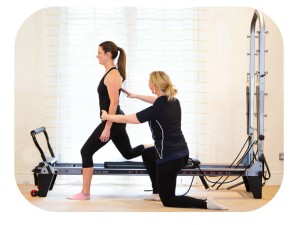Pilates is a form of exercise created by Joseph Pilates in the 1920’s as a way of keeping troops fit and healthy during the war. The benefits of this way of exercising quickly spread and became popular among dancers due to its focus on strengthening the core musculature and increasing mobility through other joints. Pilates comprises exercises designed to strengthen the deep abdominal muscles and increase flexibility of surrounding joints thus leading to good posture and alignment and better movement of the body. It focuses on allowing the body to move as it was meant to. The main function of the core muscles is to support the spine and increase stability leading to less pressure on the spine.
With people who have low back pain, the way in which you use your muscles can be altered as certain movements may be avoided as they are painful. Back pain can be caused by both stiffness or increased movement through the back and the vertebrae. It can have an impact on posture and alignment. Due to the importance of the core muscles in supporting the back, it is important that they are strengthened and used as they should to decrease the pressure on the spine. This is why is it important to do these strengthening exercises correctly and engage the correct muscles. Many people think of the rectus abdominus muscle or the “six pack” muscle when they think of their core, but with pilates, the core refers to the deeper layer of muscles that connect like a band all the way around the trunk. This is the muscle that provides the stability.
Strengthening of the core muscles can alleviate back pain as it trains the body to co-ordinate activity of the trunk muscles and aids in correct movement. This also allows for good alignment which helps with back pain that is caused by poor positioning. As the abdominals gain strength, those of the back begin to relax.
Whether your back pain is due to stiffness or increased movement at the spine, there are pilates exercises that can help. Back pain can impact differently on different people, and for that reason, it is most beneficial when delivered as an individualised program tailored to each person’s individual needs as in our Clinical Pilates classes. If you are interested in getting an assessment, call 086 358 2911.
Written by: Roisin Carroll

